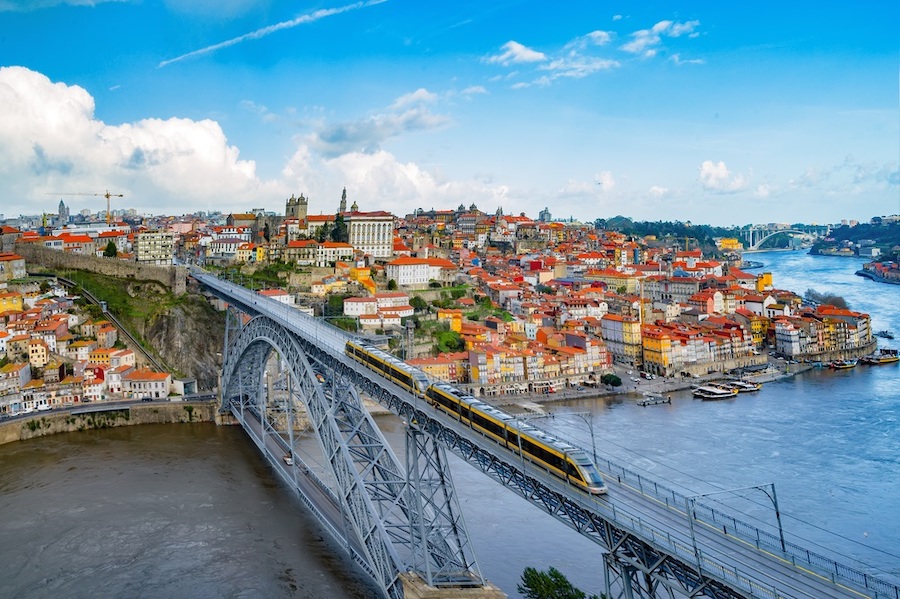All about moving to Portugal and obtaining citizenship in this country

Portugal has long been one of the most popular destinations for expats from all over the world. And if earlier this Southern European republic was more interesting only as a tourist destination, now many people consider this region as an excellent option for emigration. Not only the beautiful climate, the presence of picturesque beaches and unique attractions attract people and contribute to the desire to move to live in Portugal. For the most part, the urgency of moving to this region is due to the high standard of living of the population, high wages and excellent conditions for entrepreneurial activity.
Portugal migration
Portugal is a European country located on the Iberian Peninsula, washed by the Atlantic Ocean and bordered by Spain. The state is one of the developed countries and is a member of the European Union. Potential emigrants from post-Soviet countries and the CIS are increasingly thinking about living in Portugal. A developed state with a developed economy and open business, politically stable, with a low crime rate and high standards of living-all this is what emigrants in Portugal want to get. It is the superiority of the standard of living here that in many cases becomes the key point when you want to move to permanent residence.
It is noteworthy that this state is considered one of the most affordable options for moving to Europe. According to official data, more than 10 million people live in the Republic, more than 600 thousand of them are foreigners permanently and legally residing in the region. And all this is due to the fact that moving to Portugal for permanent residence is quite real, since the authorities and laws are quite loyal to attracting migrants.
Portugal leaving for permanent residence: advantages and disadvantages

Over the past few years, this Republic has shown stable economic growth, a significant increase in the standard of living and quality of life, and a decrease in unemployment. But these are not all the advantages that attract potential residents who want to go to live in Portugal.
Objectively, there are simply no disadvantages to moving to this region, but some citizens of Russia, Ukraine, Belarus and other post-Soviet countries consider the following disadvantages::
- The need to learn a language.
- Small salaries compared to other EU members and, accordingly, economic problems at the start.
- Problems of adaptation in the new society.
Some people are also confused: job search, traffic conditions in the Republic (driving through narrow streets), unusual climate, lack of central heating, difficulties with Visa/MasterCard cards (they are not accepted everywhere, since the state uses the Multibanco interbank network).
But as for the advantages of permanent residence in Portugal, there are many of them. Let’s look at the most compelling reasons for moving:
- The cost of accommodation.By the standards of the European Union, the Republic is quite affordable for the cost of living.Therefore, moving to Portugal for permanent residence is an affordable opportunity to get citizenship of one of the most inexpensive European countries in terms of cost of living in the future.The region is characterized by an affordable cost of real estate, as well as low prices for consumer goods.
- High level of medicine.This is an extremely important point in the modern world.The state provides its citizens and residents with guaranteed high-quality medical care, which is considered one of the best in terms of level in the EU.The right to free medical care, in addition to the Portuguese, is also granted to holders of resident status.
- High level of education.Thanks to excellent and affordable secondary and higher education, emigration to Portugal will allow you to acquire high-quality knowledge and skills, and in the future get an excellent job and build a career, both in the Republic and abroad.
- Safety.For many, this moment becomes fundamental before emigrating to Portugal.The republic ranks first in the ratings of safe places to live, since the majority of the population here is law-abiding and peace-loving.The region is characterized by a low level of corruption, and its residents are friendly to newcomers.
- EU citizenship in 5 years.After five years of residence in Portuguese territory, everyone has the opportunity to apply for EU citizenship, which will allow them to legally live and work in any member state of the Union.
- Climate.This is the sunniest area in Europe, where the sun shines 300 days a year.The average temperature is about +30°C in summer and +15°C.Happy winter.And due to the fact that different regions differ in their climatic conditions (north-east – hotter, north-west – wetter, south – warm, arid), everyone will be able to choose the most suitable region for moving and living.
- Doing business.To legally conduct business on the territory of the state, foreigners must have a certain status.Potential residents who intend to obtain Portuguese citizenship in the future can absolutely legally conduct their business activities, open bank accounts, and create companies/open their branches, take out loans, and optimize taxes.Usually, the registration of commercial activities does not have any problems, but it has significant business development prospects at the European and global levels.
- Common English.Due to the fact that the country is a member of the EU, English is very common here.So you don’t have to worry about having perfect Portuguese right away.In most cases, it is required for communication in various state institutions.
- Recreation and entertainment.This land is simply filled with an abundance of all kinds of entertainment, from which you can always choose the most suitable to your taste.The beautiful climate, the Atlantic Ocean, picturesque beaches, relief mountains and unique attractions attract not only travelers, but also potential citizens who want to permanent residence in Portugal.
- Kindness to foreigners.This country has repeatedly taken top places in world rankings for hospitality and friendliness to foreigners.Local residents are well aware that foreigners planning to move do so absolutely legally, and in the future they will become a part of the Republic, its functional mechanism that allows developing the local economy.
How to get Portuguese citizenship

Thanks to the stable economic growth over the past few years, the standard of living here is constantly growing and therefore the demand for obtaining residency and citizenship is increasing. And the frequent emigration to Portugal from Russia is also due to the fact that the region is regarded as a prosperous state with a measured and calm life, with friendly and benevolent citizens who are not in a hurry, do not fuss.
Those who are interested in the question of how to move to live in Portugal, you need to know that this will have to go through several stages. In order to apply for legal permanent residence in the region, entry to its territory must be carried out on a national, not a Schengen visa. The right of visa-free entry to the EU (available to citizens of Georgia, Moldova and Ukraine) is not suitable for these purposes. Obtaining a national Portuguese visa and arriving legally in the country is a single way to emigrate to Portugal.
The first stage of obtaining permanent residence in Portugal is to apply to the country’s consulate for a national visa. To do this, you must::
- visa application form;
- passport;
- in case of traveling with the family, marriage certificates, birth certificates of children;
- availability of grounds to apply for a national visa, confirmed by the relevant documents;
- confirmed funds for staying in the country;
- availability of a place of residence in the state, confirmed by the relevant documents;
- a certificate of no criminal record;
- health insurance valid on the territory of the Republic of Moldova;
- translation and apostille of all documents and references.
The second stage is the registration of a residence permit in the state. Its registration is carried out in the local migration services. There are several ways to get this right to live in the region:
- Grounds for students.Here, students of higher educational institutions have the right to stay for 1 year, with subsequent extension.It requires a document of admission to the local university.
- Labor migration.To be able to obtain a first residence permit, you must legally enter into an employment contract with a Portuguese employer.Although this is not an easy path, it is quite feasible.
- Family reunion.Portuguese citizens and legalized foreigners can apply for this right, they can move their spouses, minor children, parents over 65 years of age, disabled family members under guardianship.
- Investment.Conducting legal, profitable business activities in the country and paying taxes here is another proven way to get resident status.
- “Golden visa”.The program of local authorities to attract investment in exchange for the right of residence is a very common practice.The “golden” residence permit can be obtained in two ways: by purchasing real estate worth more than 350 thousand euros or by investing in the local economy in excess of 250 thousand euros.
- A start-up visa is part of business migration.It involves moving to Portugal to open a branch of an existing business project or start a new one on the territory of the Republic.To do this, it is necessary to confirm that the business is innovative, that it has sufficient financial resources for its activity and development, which will pay off in the future and bring profit not only to the businessman, but also to the state.
- A program for financially independent individuals.Financially independent individuals can also apply for resident status by documenting: the presence of a state, a place to live, a local bank account, and the absence of a criminal record.
- EU Blue Card (blue/blue card of the EU).This document certifies the right to live and work in the territory of an EU member state, after one and a half years of employment in any part of the European Union.This option is intended only for highly qualified specialists.To get a Blue Card, you need: a contract with a Portuguese company, educational documents, a salary statement, and a standard certificate of no criminal record and med.insurance.
The third stage is moving to Portugal for permanent residence. You can apply only after 5 years of living here. The document is open-ended, but requires proof of residency (payment of taxes) every 5 years. The package of documents for registration may vary in each individual situation, but the general list looks like this::
- proof of residence in the country for 5 years;
- document on passing the language proficiency test at the basic level;
- proof of housing availability;
- proof of the existence of means of subsistence;
- confirmation of no criminal record.
The next step for a typical immigrant is to obtain Portuguese citizenship. Anyone who has permanent residence or has lived in the country for more than five years can get it. You can apply for citizenship immediately after obtaining the right to permanent residence in the country, although the application can be considered for about a year. In addition to permanent residence bonuses, the passport allows the holder to travel without a visa to more than 180 countries around the world, study/work/live without any restrictions in any EU country, receive social security from the country, and take part in elections.
Refusal to obtain any of the statuses (national visa, residence permit, permanent residence or citizenship) can be obtained in case of incorrect filling out of papers, lack of any documents/references, or detection of false information.















Leave a Reply